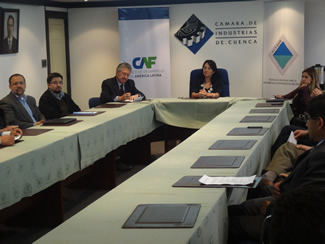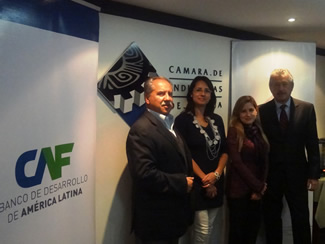Productive Clusters Project in Cuenca ends successfully
Specific improvements were introduced in the production chains both of electrical appliances and wooden furniture.
(Cuenca, April 07th, 2013). CAF, Development Bank of Latin America, together with the Development Agency of Cuenca ACUDIR, presented the results of the Local Productive Clusters in Cuenca (APLs, for its acronym in Spanish), aimed at the competitive strengthening of the productive chains of wooden furniture and electrical appliances in this city and its vicinity.
For Hermann Krützfeldt, CAF's Director Representative in Ecuador, "the project enabled the promotion of entrepreneurial development in the city of Cuenca and the Azuay by strengthening the local productive capacities, improving the business climate, and developing an agenda of reforms aimed at a more effective support to the relevant productive sectors in the region".
The project was conceived in 2011, following CAF's strategic guidelines regarding productive transformation, and is aligned with the national plan to change the productive matrix, becoming an essential model for other initiatives that are being developed throughout the country around this important national objective.
The approach of the project was comprehensive. From a productive point of view, it introduced specific improvements in production chains, both in electric appliances and wooden furniture, managing to reduce production times throughout the chain, improve productivity, and even substitute imports of specific pieces required for the assembly of the final products, as for example refrigerators, which improved in quality and production costs.
In addition, the comprehensive approach also addressed issues linked to the business climate and the institutional capacity of all private, public, academic, and mixed organizations that offer support services for the development of these productive activities.
The APLs are framed within a series of CAF supported initiatives in the city of Cuenca, whose competitive potential is a model in other countries since, from the experience of Cuenca, it has been possible to repeat similar projects through CAF in Arequipa (Peru) and Barranquilla (Colombia).
One of the complementary projects which is already in its execution phase in Azuay is the development of the Innovation Ecosystem of the Construction sector. In addition, CAF participates in the dialogue activities that are currently taking place to coordinate all these efforts into a competitive development plan for the whole region.
CAF's more recent content

CAF, ECLAC, IDB and PAHO Promote Sustainable Development in the G20
The Regional Organizations of the Americas congratulate Brazil on its successful G20 Presidency, highlighting its leadership on key issues such as poverty, governance, and climate change. They also reaffirm their commitment to actions that promote equity and development in the region.
Urgent Call for Action to Safeguard Caribbean SIDS at CAF Symposium
As the global community grapples with the escalating climate crisis, Caribbean Small Island Developing States (SIDS) are running out of time to secure critical investments and support needed to strengthen their economies and protect vulnerable communities from the intensifying impacts of climate change. With the window to take decisive action rapidly shrinking, CAF - Development Bank of Latin America and the Caribbean, in partnership with the Commonwealth Secretariat and the Antigua and Barbuda High Commission, brought together key stakeholders for a symposium in London to address the critical vulnerabilities Caribbean SIDS face.

